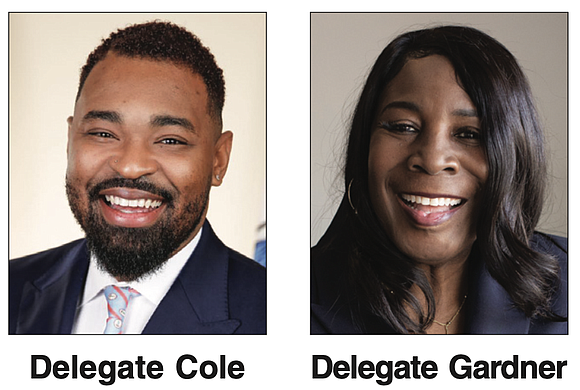VLBC sees progress
George Copeland Jr. | 2/15/2024, 6 p.m.
The Virginia Legislative Black Caucus announced progress in its legislative agenda in terms of voter rights, criminal justice, education, arrest and confinement, and more.
In a press conference early Wednesday morning, VLBC members said that more than 20 bills have successfully passed their initial approval in the House of Delegates or the Virginia Senate and are now one step closer to becoming law.
Senate Bill 300 from Sen. Aaron R. Rouse, D-7th District, seeks to ensure voters flagged for felony convictions are alerted two weeks ahead of their potential removal from voting records, allowing them to either correct an error in filing or verify that their voting rights have been restored in a sworn statement.
If signed into law, it also would require the Department of Elections to include more identification information for data matching and maintaining voter rolls. It passed the Senate 21 to 19 on Tuesday.
The “Virginia Legislative Black Caucus remains united in our fight against ongoing Republican efforts to rollback voting rights, and to establish anti-voter and anti-democratic policies,” Sen. Rouse said.
In terms of education, House Bill 187 from House Delegate Nadarius E. Clark would require Gov. Glenn A. Youngkin’s budget bills for the 2025, 2026 and 2027 General Assembly sessions to include teacher and school staff compensation at or above the national salary levels. It passed the House 74 to 24 with multiple Democratic co-patrons.
HB 187 heads to the Senate alongside bills from Delegate Joshua G. Cole and Delegate Deborah Gardner, HB 536 and 1375 respectively, that seek to better define bullying in the context of public education and codify the Mixed Delivery Grant Program and Child Care Subsidy Program as early childhood programs in Virginia. Both passed in a 53 to 43 and 90 to 9 vote, respectively.
When it came to efforts in incarceration and criminal justice, two VLBC billsfocused on restricting the use of solitary confinement in prison have passed both chambers. SB 719 from Senator Lamont
Bagby and House Bill 1244, sponsored by Delegate Cole, passed this week in a 21 to 18 vote and 51 to 48 vote, respectively.
The bills were presented by Delegate Cole as a way to “readjust the reins” of correctional facilities, while avoiding undue punishment for the incarcerated.
“As we take a look into this, we have to make sure if we’re working with the Department of Corrections, that we have to be working in good faith,” Delegate Cole said. “It’s a time to reflect on the status quo (...) and it’s a time to say we are actually better than this.”
Related bills from Sen. Bagby, SB 546 and 547, would allow a family member or legal guardian of an individual to help decide if they qualify for a psychiatric temporary detention order, and would require law enforcement training for people with autism respectively. Both bills were unanimously approved in the Senate.
Criminal justice bills that have passed their chambers include HB 1496 from Delegate Sam Rasoul, which seeks to regulate law-enforcement agencies’ use of surveillance by creating a registry of surveillance technologies maintained by the Department of Criminal Justice Services. The bill passed the House 82 to 17.
A bill from Delegate Marcia Price, HB 611, focused on increased reporting of and transparency around deaths in police custody also passed the House 94 to 5.
Other VLBC bills tackled criminal justtice reform through the financial burdens the legal system places on low-income Virginians. Bills from Sen. Williams Graves and Delegate Price would create payment plans and deferred payment agreements for incarcerated individuals facing court fees. Both bills, SB 654 and HB 612, passed their respective chambers alongside a bill with similar aims from Delegate Price, HB 614, which would create a program providing community service opportunities for the incarcerated as an alternative to fine payments.
“Because of these bills, Virginians will not immediately be hit with massive fines and fees payments when they are returning from incarceration,” Delegate Rae C. Cousins said, “giving them a better chance to become established and land on their feet.”
Also passed was HB 246, sponsored by new Delegate Michael Jones, which would make the fines, penalties and other costs of criminal and traffic cases more transparent for defendants. Another bill
focused on indigent defendants from new Delegate Cousins, HB 824, would not hold them liable for potential increases in court-appointed attorney fees, lifting financial worries while encouraging more attorneys to serve in court appointment cases.
Additional bills from VLBC’s legislative agenda that passed their chambers focus on expunging juvenile court records for certain offenses that would be felonies for adults, easing employment for those in the recovery community, and reducing the offense for possession of a controlled substance smaller than one gram.






